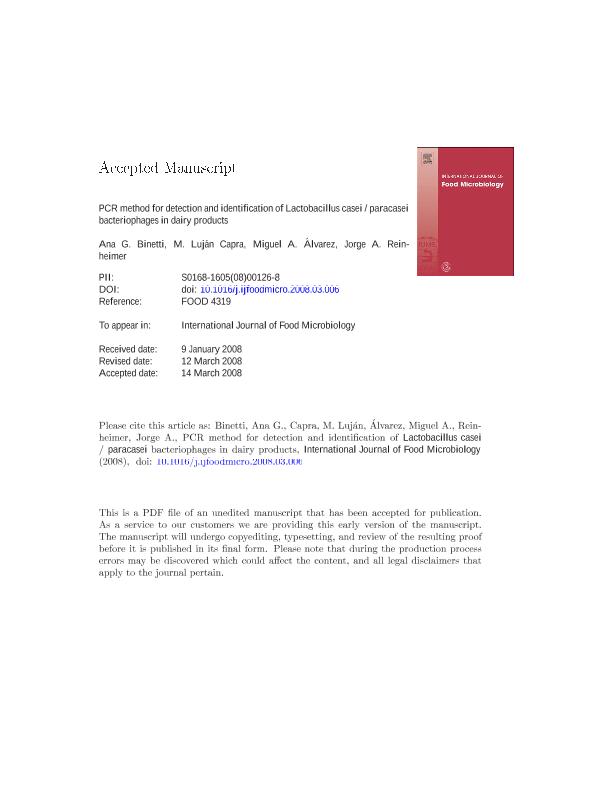Mostrar el registro sencillo del ítem
dc.contributor.author
Binetti, Ana Griselda

dc.contributor.author
Capra, María Luján

dc.contributor.author
Alvarez, Miguel
dc.contributor.author
Reinheimer, Jorge Alberto

dc.date.available
2020-10-29T20:00:09Z
dc.date.issued
2008-05
dc.identifier.citation
Binetti, Ana Griselda; Capra, María Luján; Alvarez, Miguel; Reinheimer, Jorge Alberto; PCR method for detection and identification of Lactobacillus casei/paracasei bacteriophages in dairy products; Elsevier Science; International Journal of Food Microbiology; 124; 2; 5-2008; 147-153
dc.identifier.issn
0168-1605
dc.identifier.uri
http://hdl.handle.net/11336/117192
dc.description.abstract
Bacteriophage infections of starter lactic acid bacteria (LAB) pose a serious risk to the dairy industry. Nowadays, the expanding use of valuable Lactobacillus strains as probiotic starters determines an increase in the frequency of specific bacteriophage infections in dairy plants. This work describes a simple and rapid Polymerase Chain Reaction (PCR) method that detects and identifies bacteriophages infecting Lactobacillus casei/paracasei, the main bacterial species used as probiotic. Based on a highly conserved region of the NTP-binding genes belonging to the replication module of L. casei phages φA2 and φAT3 (the only two whose genomes are completely sequenced), a pair of primers was designed to generate a specific fragment. Furthermore, this PCR detection method proved to be a useful tool for monitoring and identifying L. casei/paracasei phages in industrial samples since specific PCR signals were obtained from phage contaminated milk (detection limit: 104 PFU/mL milk) and other commercial samples (fermented milks and cheese whey) that include L. casei/paracasei as probiotic starter (detection limit: 106 PFU/mL fermented milk). Since this method can detect the above phages in industrial samples and can be easily incorporated into dairy industry routines, it might be readily used to earmark contaminated milk for use in processes that do not involve susceptible starter organisms, or processes which involve phage-deactivating conditions.
dc.format
application/pdf
dc.language.iso
eng
dc.publisher
Elsevier Science

dc.rights
info:eu-repo/semantics/openAccess
dc.rights.uri
https://creativecommons.org/licenses/by-nc-sa/2.5/ar/
dc.subject
BACTERIOPHAGES
dc.subject
LACTOBACILLUS CASEI/PARACASEI
dc.subject
PCR DETECTION
dc.subject
PROBIOTIC LACTIC ACID BACTERIA
dc.subject.classification
Alimentos y Bebidas

dc.subject.classification
Otras Ingenierías y Tecnologías

dc.subject.classification
INGENIERÍAS Y TECNOLOGÍAS

dc.title
PCR method for detection and identification of Lactobacillus casei/paracasei bacteriophages in dairy products
dc.type
info:eu-repo/semantics/article
dc.type
info:ar-repo/semantics/artículo
dc.type
info:eu-repo/semantics/publishedVersion
dc.date.updated
2020-10-14T21:24:44Z
dc.journal.volume
124
dc.journal.number
2
dc.journal.pagination
147-153
dc.journal.pais
Países Bajos

dc.journal.ciudad
Amsterdam
dc.description.fil
Fil: Binetti, Ana Griselda. Consejo Nacional de Investigaciones Científicas y Técnicas. Centro Científico Tecnológico Conicet - Santa Fe. Instituto de Lactología Industrial. Universidad Nacional del Litoral. Facultad de Ingeniería Química. Instituto de Lactología Industrial; Argentina
dc.description.fil
Fil: Capra, María Luján. Consejo Nacional de Investigaciones Científicas y Técnicas. Centro Científico Tecnológico Conicet - Santa Fe. Instituto de Lactología Industrial. Universidad Nacional del Litoral. Facultad de Ingeniería Química. Instituto de Lactología Industrial; Argentina
dc.description.fil
Fil: Alvarez, Miguel. Instituto de Productos Lácteos de Asturias; España
dc.description.fil
Fil: Reinheimer, Jorge Alberto. Consejo Nacional de Investigaciones Científicas y Técnicas. Centro Científico Tecnológico Conicet - Santa Fe. Instituto de Lactología Industrial. Universidad Nacional del Litoral. Facultad de Ingeniería Química. Instituto de Lactología Industrial; Argentina
dc.journal.title
International Journal of Food Microbiology

dc.relation.alternativeid
info:eu-repo/semantics/altIdentifier/url/http://www.sciencedirect.com/science/article/pii/S0168160508001268
dc.relation.alternativeid
info:eu-repo/semantics/altIdentifier/doi/http://dx.doi.org/10.1016/j.ijfoodmicro.2008.03.006
Archivos asociados
